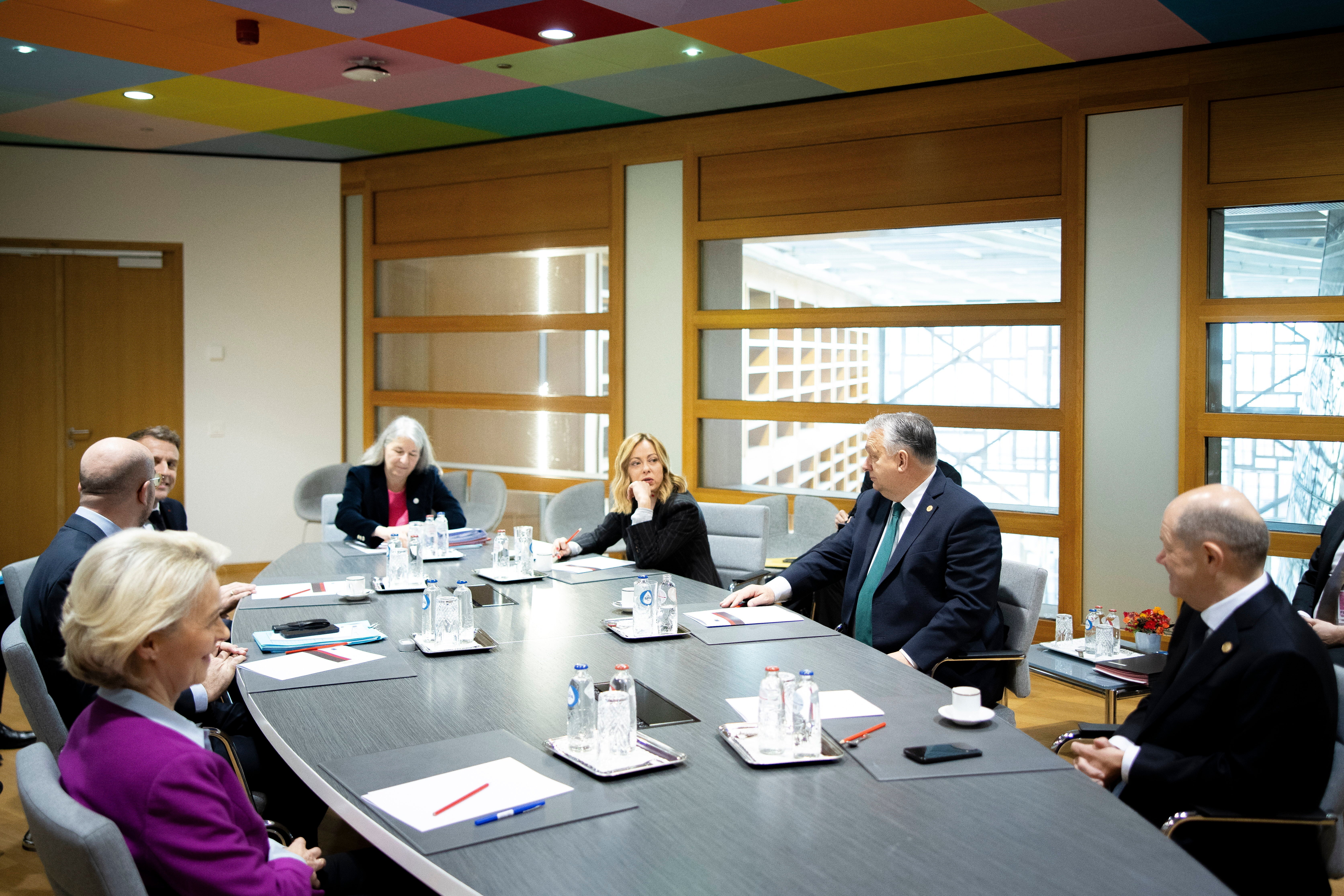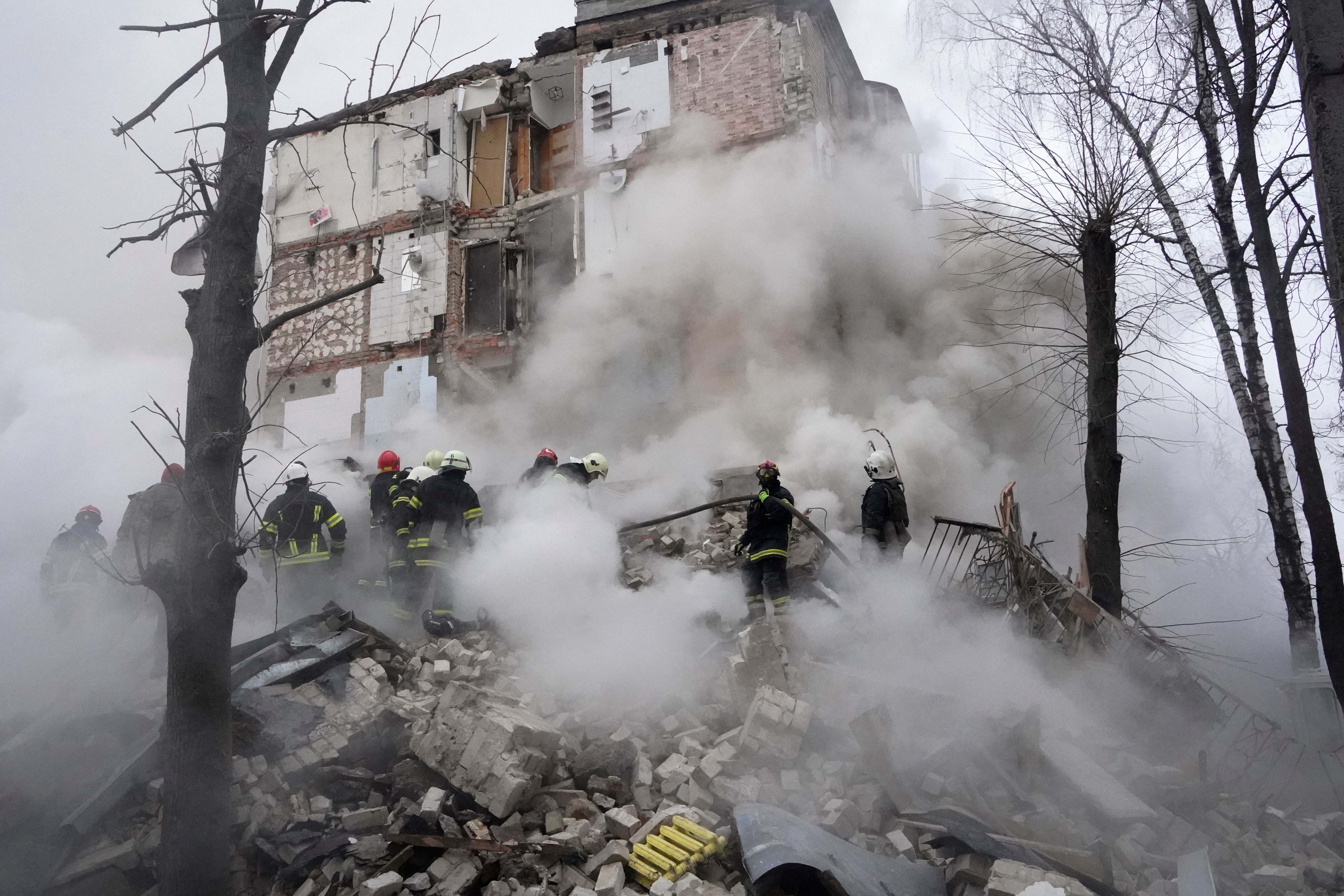EU faces showdown with Hungary’s Orban over crucial aid for Ukraine to fight Putin’s forces
Hungary remains opposed to a €50bn aid package to Ukraine ahead of a European Union summit on Thursday

Your support helps us to tell the story
From reproductive rights to climate change to Big Tech, The Independent is on the ground when the story is developing. Whether it's investigating the financials of Elon Musk's pro-Trump PAC or producing our latest documentary, 'The A Word', which shines a light on the American women fighting for reproductive rights, we know how important it is to parse out the facts from the messaging.
At such a critical moment in US history, we need reporters on the ground. Your donation allows us to keep sending journalists to speak to both sides of the story.
The Independent is trusted by Americans across the entire political spectrum. And unlike many other quality news outlets, we choose not to lock Americans out of our reporting and analysis with paywalls. We believe quality journalism should be available to everyone, paid for by those who can afford it.
Your support makes all the difference.Hungary leader Viktor Orban has sat down with the European Union’s five most powerful leaders ahead of a summit that could decide the future of the bloc’s financial aid to Ukraine during a key juncture in its war against Russia.
Mr Orban remains the last member of the EU opposing a €50 billion (£43bn) support package for Kyiv - the motion requires unanimity to be passed - and the bloc’s leaders arrived this morning nervous to finally push through a deal that has been delayed multiple times.
The Hungarian leader, who met with Russian autocrat Vladimir Putin last October in Beijing, has refused to approve military aid to Ukraine and has proved a permanent obstacle to the bloc’s ambitions to send communal support to Kyiv.
Posting a picture of his meeting with European Commission President Ursula von der Leyen, European Council President Charles Michel, French leader Emmanual Macron, German Chancellor Olaf Scholz and Italian Prime Minister Giorgia Meloni, he described the sit down as a “casual morning conversation”.
But the stakes for Ukraine, for the European Union and for the collective opposition to Russian aggression has never been higher.
Poland’s new prime minister Donald Tusk, a staunch ally of Ukraine, said he had “nothing nice” to say to Mr Orban when he arrived in Brussels this morning.
Kaja Kallas, the Estonian leader, another strong ally of Kyiv, made portentous comments about the state of Hungary’s economy when asked about her hopes of a deal today.
Her comments were a thinly-veiled reference to an EU plan leaked on Sunday to strong-arm Hungary into approving the bill by threatening to permanently shut off all funding to Budapest if Mr Orban continued to block the bill.
“If you look at the economy of Hungary... the interest rate of their central bank is 9 percent, that shows how well his economy is going,” she said. “Hungary needs Europe, so he should also look into what is in it for Hungary, being in Europe."
But other leaders were more optimistic.
Germany’s Chancellor Scholz, as he arrived for the summit, said: “My strong conviction is that this should be possible. It’s time to make this happen.”
Outgoing Dutch prime minister Mark Rutte said he was “cautiously optimistic”, adding “I do believe we have come to an agreement today with the 27, including Hungary.”
The European Union last night made a last-ditch attempt to convince Hungary and its pro-Kremlin leader to cease blocking further aid to Ukraine by offering the chance to debate funding annually.
EU ambassadors, following a meeting on Wednesday ahead of the summit today, agreed to the proposal of an annual debate over the package to Ukraine worth around €50 billion (£43bn), according to a draft summit.
The EU aid is to help cover Ukraine’s needs for 2024-2027, with €33 billion in cheap loans and €17 billion in grants from the bloc’s budget to give Kyiv stable financing as it fights off Russia’s invasion. It is not a military package.
Mr Orban has been pushing for an annual review that would give Hungary a right to veto the disbursements every year.
This goes against the idea of predictable funding and other EU countries reject it, but if the money is to come from the EU budget, it requires unanimity among the 27 EU countries, so Hungarian consent is necessary.

In an attempt to win Hungary over, the EU ambassadors agreed to propose to Budapest that they hold yearly debates on how the bloc money is being spent by Ukraine, based on reports by the European Commission.
This would not give Hungary a right to veto the money - but it would allow them to air concerns.
“The European Council will hold a debate each year on the implementation of the facility with a view to providing guidance on the EU approach towards the situation stemming from Russia’s war of aggression against Ukraine,” the draft read.
It remains unclear if Hungary’s Prime Minister Viktor Orban will agree to such a deal.
But Hungary’s representative at the EU ambassador meeting on Wednesday allegedly responded to the proposal by reiterating that Budapest demands an annual veto on the funding.
Multiple attempts to convince Hungary to give its consent have failed over the past few months.
EU diplomats told Politico last week that if Mr Orban blocks Ukraine aid again during the meeting on Thursday, Brussels could look to invoke Article 7, the most serious political sanction on a member country that involves suspending its right to vote on EU decisions.
“If Mr Orban really blocks again an agreement [on the budget and the €50 billion for Ukraine] at the February summit, using Article 7 to strip Hungary of its voting rights could become a real option,” said one EU diplomat.
But Poland’s Mr Tusk said this morning that there was no “plan B” if Mr Orban remains obstinate.
During the last round of talks, Mr Orban refused to back down despite the EU releasing €10.2bn of bloc funding to Hungary the night before the meeting. The money had been previously withheld on grounds that Mr Orban was violating the rule of law prerequisites of EU membership.
After those talks concluded with no deal on Ukraine aid, Mr Orban told Hungarian state radio: “[The EU] wants to give the money of the Hungarians to continue the war. This is not acceptable.”
He did, however, allow Ukraine and Moldova to start membership to the bloc talks; he did so not by approving the application but by going “for a coffee” while the vote was taking place.
European Council President Charles Michel said at the time it was important that “no member states opposed this decision”, a reference to Mr Orban’s lack of approval.
Failure to pass additional aid to Ukraine would force the bloc to rethink again how best to fund the prospective member in its war against Russia.
The most obvious option would be to extend an existing loan scheme for 2024, which does not require unanimity.
The 26 countries would need to set up two intergovernmental schemes to allow the bloc to transfer grants and loans to Ukraine, but this would require parliamentary approval from individual countries.
Join our commenting forum
Join thought-provoking conversations, follow other Independent readers and see their replies
Comments